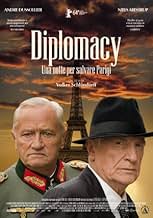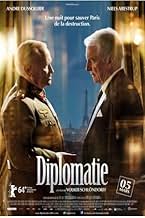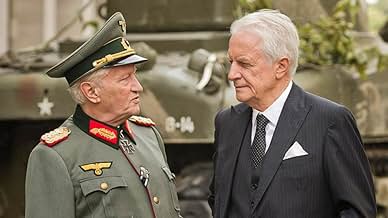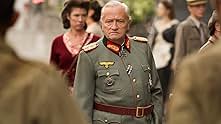AVALIAÇÃO DA IMDb
7,1/10
6,1 mil
SUA AVALIAÇÃO
Adicionar um enredo no seu idiomaA historical drama that depicts the relationship between Dietrich von Choltitz, the German military governor of occupied Paris, and Swedish consul-general Raoul Nordling.A historical drama that depicts the relationship between Dietrich von Choltitz, the German military governor of occupied Paris, and Swedish consul-general Raoul Nordling.A historical drama that depicts the relationship between Dietrich von Choltitz, the German military governor of occupied Paris, and Swedish consul-general Raoul Nordling.
- Direção
- Roteiristas
- Artistas
- Prêmios
- 5 vitórias e 6 indicações no total
Pierre-Marie Rochefort-Schneider
- Opérateur radio
- (as Pierre-Marie Rochefort)
Avaliações em destaque
My wife and I went to see this film a few days ago, I loved it. Excellent acting! I find the title, "Diplomatie" to fit in very well with the observation that the Swedish diplomat clearly had no intention whatever to honour his promises to the German general (i.e. to take care of his family in mortal danger of suppression by the Nazi establishment). In other words, my reading is that diplomatic practice apparently provides the practitioner of that particular political act the green light to do whatever he deems necessary to reach the objective of the "raison d'état", not excluding playing on emotions or even outright lying. Not a pretty observation. Is it correct? Neither am I convinced the film is to be taken as historically correct: the decision not to destroy Paris was the result of a balanced appraisal of the fact that it was not the communists (resistance) that liberated Paris, but ...Spanish... troops in the service of General De Gaulle executing an agenda not quite in line with American instructions. Comme quoi History is often written with a small "h".
Cyril Gély's play 'Diplomatie' opened at the Théatre de la Madeleine in 2011 with Niels Arestrup as Dietrich von Choltitz and André Dusollier as Raoul Nordling. It ran for three hundred performances so both actors certainly had long enough to get it right! Although the ways of Film are mysterious, when it came time to adapt the piece for the screen they were obvious choices and luckily for us they were able to reprise their roles.
The relationship between the characters of von Choltitz, Governor-General of occupied Paris and Swedish consul Nordling had been touched upon in René Clément's sprawling and star-studded epic 'Is Paris burning?' in which they were played by Gert Frobe and Orson Welles. They met on several occasions but for the dramatic purposes of the play Gély depicts one fictional meeting that takes place in the L'Hotel Meurice on the Rue de Rivoli just hours before von Choltitz is due to carry out Hitler's order to destroy Paris rather than let it to fall into the hands of the advancing Allies.
Here, as opposed to the earlier film, the emphasis is on individual rather than collective action. The means by which Nordling allegedly convinces the hard-nosed and brutal General to rescind Hitler's maniacal order are of course purely hypothetical but results in excellent theatre. Presumably Gély had access to the General's memoirs but how reliable are these one wonders? There are some who have suggested that von Choltitz is merely motivated by the desire to save his own skin, knowing that his previous military actions in Rotterdam and Sevastopol would mark him out as a war criminal(in fact he only served two years in prison) and that anyway, he lacked sufficient time and resources to carry out the order effectively. What is plausible and very much in keeping with the characters is that Nordling promises to get von Choltitz' wife and children out of Germany and into safety in Switzerland if he surrenders the city. It is known than Choltitz had previously refused to obey Himmler's order to ransack the Louvre so already the seeds of defiance were being sewn and like so many officers of the Wehrmacht he had serious doubts about Hitler's sanity. Perhaps after all Nordling wasn't required to do too much persuading.
As for the film Volker Schloendorff has done a marvellous job in sustaining our interest in what is essentially a two-hander. The camerawork of Michel Amathieu is excellent and although shot in colour the contrasts between light and dark aid the drama immeasurably. The director mainly keeps the action within the proscenium arch but a filmically effective scene is where von Choltitz rescinds the order whilst on the roof of the hotel so that both he and the audience have the panorama of Paris in view.
Schloendorff has achieved a perfect balance here between film and filmed theatre and has the advantage in Arestrup and Dusollier of two consummate professionals at the top of their game.
Seventy-five years on it is difficult to appreciate just how close Paris came to destruction. One would dearly love to believe that Nordling's arguments won the day as it gives us a feeling that maybe, just maybe, 'the strength of one in tongue and speech is mightier than all fighting.' We live in hopes!
The relationship between the characters of von Choltitz, Governor-General of occupied Paris and Swedish consul Nordling had been touched upon in René Clément's sprawling and star-studded epic 'Is Paris burning?' in which they were played by Gert Frobe and Orson Welles. They met on several occasions but for the dramatic purposes of the play Gély depicts one fictional meeting that takes place in the L'Hotel Meurice on the Rue de Rivoli just hours before von Choltitz is due to carry out Hitler's order to destroy Paris rather than let it to fall into the hands of the advancing Allies.
Here, as opposed to the earlier film, the emphasis is on individual rather than collective action. The means by which Nordling allegedly convinces the hard-nosed and brutal General to rescind Hitler's maniacal order are of course purely hypothetical but results in excellent theatre. Presumably Gély had access to the General's memoirs but how reliable are these one wonders? There are some who have suggested that von Choltitz is merely motivated by the desire to save his own skin, knowing that his previous military actions in Rotterdam and Sevastopol would mark him out as a war criminal(in fact he only served two years in prison) and that anyway, he lacked sufficient time and resources to carry out the order effectively. What is plausible and very much in keeping with the characters is that Nordling promises to get von Choltitz' wife and children out of Germany and into safety in Switzerland if he surrenders the city. It is known than Choltitz had previously refused to obey Himmler's order to ransack the Louvre so already the seeds of defiance were being sewn and like so many officers of the Wehrmacht he had serious doubts about Hitler's sanity. Perhaps after all Nordling wasn't required to do too much persuading.
As for the film Volker Schloendorff has done a marvellous job in sustaining our interest in what is essentially a two-hander. The camerawork of Michel Amathieu is excellent and although shot in colour the contrasts between light and dark aid the drama immeasurably. The director mainly keeps the action within the proscenium arch but a filmically effective scene is where von Choltitz rescinds the order whilst on the roof of the hotel so that both he and the audience have the panorama of Paris in view.
Schloendorff has achieved a perfect balance here between film and filmed theatre and has the advantage in Arestrup and Dusollier of two consummate professionals at the top of their game.
Seventy-five years on it is difficult to appreciate just how close Paris came to destruction. One would dearly love to believe that Nordling's arguments won the day as it gives us a feeling that maybe, just maybe, 'the strength of one in tongue and speech is mightier than all fighting.' We live in hopes!
This is a brilliant film.
Masterfully set in the tense historical and ideally theatrical moment, the story demonstrated that the combination of the power of the iron will and the eloquent linguistic skills, both built on the trust of the two human beings, was able to defy something impossible.
From the linguistic point of view, the film was made very realistic, switching between German and French. This is a relief, given a flood of supposedly European movies of recent with a way too many English speaking characters.
I want my children to watch this film to eyewitness the history and perhaps something more important than that: Words, not the sword, saved Paris and her people from calamity.
Masterfully set in the tense historical and ideally theatrical moment, the story demonstrated that the combination of the power of the iron will and the eloquent linguistic skills, both built on the trust of the two human beings, was able to defy something impossible.
From the linguistic point of view, the film was made very realistic, switching between German and French. This is a relief, given a flood of supposedly European movies of recent with a way too many English speaking characters.
I want my children to watch this film to eyewitness the history and perhaps something more important than that: Words, not the sword, saved Paris and her people from calamity.
Diplomacy (2014)
Blow up Paris? Notre Dame, the Eiffel Tower, the Louvre? Yes—almost. And for real. It's 1944.
In the final days (or day) of the German occupation of Paris, as the Allies were moving very quickly in, the Germans (under Hitler's orders) were increasingly desperate. And bitter. They were going to leave the lovely city in ruins—you know that kind of baby attitude, if I can't have it you can't have it either.
Well, we know that Paris was not blown up. (The city famously survived the truly brutal World War II with hardly a scratch, compared to the rest of Europe.) And the final decision —to do it or not—fell to one man, ultimately, aging commanding German General Choltitz. And a man appears in his quarters who we learn is the Swedish diplomat Raoul Nordling. Nordling sees the crisis, and sees the general's quandary, and has to find a way to stop the madness.
And so we have a condensed version of some very real events. The movie is based on a play which by necessity distilled this down to mostly these two characters in their hotel, though we are given a convincing sense of the city and the Germans around the hotel.
This is high drama in its purest simplest form—conversation. The men try to understand each other. The general knows the Swede is trying to persuade him, and the Swede knows the general is under orders that can't be defied. There is the moment, and then there is history, and how the world will later look on the moment. And it all is spelled out with such delicious economy and psychology, it's riveting.
And even though you know that Paris survives, you won't know why or how, or how close it came to rubble, until you see this.
Blow up Paris? Notre Dame, the Eiffel Tower, the Louvre? Yes—almost. And for real. It's 1944.
In the final days (or day) of the German occupation of Paris, as the Allies were moving very quickly in, the Germans (under Hitler's orders) were increasingly desperate. And bitter. They were going to leave the lovely city in ruins—you know that kind of baby attitude, if I can't have it you can't have it either.
Well, we know that Paris was not blown up. (The city famously survived the truly brutal World War II with hardly a scratch, compared to the rest of Europe.) And the final decision —to do it or not—fell to one man, ultimately, aging commanding German General Choltitz. And a man appears in his quarters who we learn is the Swedish diplomat Raoul Nordling. Nordling sees the crisis, and sees the general's quandary, and has to find a way to stop the madness.
And so we have a condensed version of some very real events. The movie is based on a play which by necessity distilled this down to mostly these two characters in their hotel, though we are given a convincing sense of the city and the Germans around the hotel.
This is high drama in its purest simplest form—conversation. The men try to understand each other. The general knows the Swede is trying to persuade him, and the Swede knows the general is under orders that can't be defied. There is the moment, and then there is history, and how the world will later look on the moment. And it all is spelled out with such delicious economy and psychology, it's riveting.
And even though you know that Paris survives, you won't know why or how, or how close it came to rubble, until you see this.
I saw this film with my girlfriend in Haus der Berliner Festpiele on February 14th as a Berlinale 2014 Special.
I went into the film with little to no knowledge on the production beforehand (ie. the actors, director, producer, scenarist) and hence, what type of film to expect, e.g. more of a "Is Paris Burning?" (1966) or a "Downfall (Der Untergang)" (2004)?, with only a vague knowledge of the subject itself plus a vague memory of reading the synopsis from the Berlinale catalogue.
Originally a play, this screen adaptation tells a fictionalized* account of the negotiations between Dietrich von Choltitz, the German General and Governor of Paris, and Raoul Nordling, the Swedish consul-general, at Hotel Meurice, the headquarters of the former on the eve of The Liberation of Paris in 1944.
It is a dialogue-driven film with very few cuts between different scenes, characters and events and maintains a very fine and serenely intriguing pace with a good script and a focus on the interplay between the main characters.
The script shines with brilliant moments of reason and questioning where humble, thought provoking and beautifully humane concepts are elegantly waved into the dialogues.
Without giving spoilers, one such particular moment was the question of future cohabitation and peace between two peoples, which I found to be the strongest and the most haunting point raised in the entire film. Clearly, the script was written to haunt the viewers with similar notes of contemplation.
However, intentions aside, the backbone of the film is the solid acting by André Dussollier (Raoul Nordling) with his ever so slightly and mischievously probing and also understandably desperate demeanor (with a devilish resemblance, as my girlfriend put it -a very fitting impression I find) and Niels Arestrup's (von Choltitz) stoic and war-worn cynicism while effortlessly switching between German and French, adding to the phonetic richness of the picture, not to forget the few if brief appearances by others. Quality of acting keeps the film together above all else and despite its flaws.
So I was quite very pleased with it during and immediately after viewing and some of the things one might call shortcomings or flaws didn't become immediately apparent to me (though they quite very much did to my girlfriend, who was quick to remind me of those).
I haven't seen the play so maybe this will be an inaccurate impression as I can't compare but it feels as though little work has been put into the script to adapt it for camera and screen or whatever effort was made, it didn't quite manage to step out of the comfort zone of theatrical traditions, to build a cinematic identity of its own.
You can tell as devices most often saved for theatrics creep into the film in manners that stick out where the lack of more convincing cinematic adaptations leave their traces.
One such particular moment was of Parisian romanticism which I felt was lifted straight from a stage performance where it would fit right in and easily find resonance with the viewers but ended up rather disconnected and overblown in the cinematic context of the film.
Likewise with introductory expositions and small editing touches reminiscent of use of prerecorded medium in theatre which didn't quite line up with the rest of the film and ended up feeling rather amateurish.
To compare to other "Chamber Play" films, it is not as dramatically tense and conflict-driven as Twelve Angry Men or, say, filled with as much suspenseful characterization and camera-work as Der Untergang. The film doesn't concern itself with so much suspense and drama to progress the plot but with intelligent questions that aim to haunt and beg to be contemplated in a serene state of mind which, I find, is where the film attempted to be and could have been the strongest and is intellectually the most significant.
That the quality of acting ended up as the strongest suit of the film, doing most of the heavy work to carry the film with all of its flaws sadly leaves it at a place short of being a classic.
Then again, what do I know?
(*: Fictionalized though still anchored in memoirs, apparently. For instance, you will find that a lot of moments from the film line up perfectly with the accounts of a particular article authored by a Kelly Bell, published online in August 19, 1996 by a World War II Magazine -src: http://goo.gl/KIFTi0 -, presumably both drawing from the 1965 novel "Is Paris Burning?" which I haven't read. -mind that the specific parallels between the film's script and the article will inevitably act as spoilers)
I went into the film with little to no knowledge on the production beforehand (ie. the actors, director, producer, scenarist) and hence, what type of film to expect, e.g. more of a "Is Paris Burning?" (1966) or a "Downfall (Der Untergang)" (2004)?, with only a vague knowledge of the subject itself plus a vague memory of reading the synopsis from the Berlinale catalogue.
Originally a play, this screen adaptation tells a fictionalized* account of the negotiations between Dietrich von Choltitz, the German General and Governor of Paris, and Raoul Nordling, the Swedish consul-general, at Hotel Meurice, the headquarters of the former on the eve of The Liberation of Paris in 1944.
It is a dialogue-driven film with very few cuts between different scenes, characters and events and maintains a very fine and serenely intriguing pace with a good script and a focus on the interplay between the main characters.
The script shines with brilliant moments of reason and questioning where humble, thought provoking and beautifully humane concepts are elegantly waved into the dialogues.
Without giving spoilers, one such particular moment was the question of future cohabitation and peace between two peoples, which I found to be the strongest and the most haunting point raised in the entire film. Clearly, the script was written to haunt the viewers with similar notes of contemplation.
However, intentions aside, the backbone of the film is the solid acting by André Dussollier (Raoul Nordling) with his ever so slightly and mischievously probing and also understandably desperate demeanor (with a devilish resemblance, as my girlfriend put it -a very fitting impression I find) and Niels Arestrup's (von Choltitz) stoic and war-worn cynicism while effortlessly switching between German and French, adding to the phonetic richness of the picture, not to forget the few if brief appearances by others. Quality of acting keeps the film together above all else and despite its flaws.
So I was quite very pleased with it during and immediately after viewing and some of the things one might call shortcomings or flaws didn't become immediately apparent to me (though they quite very much did to my girlfriend, who was quick to remind me of those).
I haven't seen the play so maybe this will be an inaccurate impression as I can't compare but it feels as though little work has been put into the script to adapt it for camera and screen or whatever effort was made, it didn't quite manage to step out of the comfort zone of theatrical traditions, to build a cinematic identity of its own.
You can tell as devices most often saved for theatrics creep into the film in manners that stick out where the lack of more convincing cinematic adaptations leave their traces.
One such particular moment was of Parisian romanticism which I felt was lifted straight from a stage performance where it would fit right in and easily find resonance with the viewers but ended up rather disconnected and overblown in the cinematic context of the film.
Likewise with introductory expositions and small editing touches reminiscent of use of prerecorded medium in theatre which didn't quite line up with the rest of the film and ended up feeling rather amateurish.
To compare to other "Chamber Play" films, it is not as dramatically tense and conflict-driven as Twelve Angry Men or, say, filled with as much suspenseful characterization and camera-work as Der Untergang. The film doesn't concern itself with so much suspense and drama to progress the plot but with intelligent questions that aim to haunt and beg to be contemplated in a serene state of mind which, I find, is where the film attempted to be and could have been the strongest and is intellectually the most significant.
That the quality of acting ended up as the strongest suit of the film, doing most of the heavy work to carry the film with all of its flaws sadly leaves it at a place short of being a classic.
Then again, what do I know?
(*: Fictionalized though still anchored in memoirs, apparently. For instance, you will find that a lot of moments from the film line up perfectly with the accounts of a particular article authored by a Kelly Bell, published online in August 19, 1996 by a World War II Magazine -src: http://goo.gl/KIFTi0 -, presumably both drawing from the 1965 novel "Is Paris Burning?" which I haven't read. -mind that the specific parallels between the film's script and the article will inevitably act as spoilers)
Você sabia?
- Citações
Général von Choltitz: Do you know what we do to men like you?
Raoul Nordling: Give them a medal?
Général von Choltitz: [breaking a smile] Yes, on occasion.
[stern again]
Général von Choltitz: Posthumously.
- ConexõesFeatured in Diplomatie: Making of (2015)
- Trilhas sonorasLa 7ème symphonie
Music by Ludwig van Beethoven (as Beethoven)
Conducted by Wilhelm Furtwängler
Berlin 1943 © Société Wilhelm Furtwängler
Performed by Berliner Philharmoniker (uncredited)
Principais escolhas
Faça login para avaliar e ver a lista de recomendações personalizadas
- How long is Diplomacy?Fornecido pela Alexa
- Officer's salute when leaving von Choltitz's office
Detalhes
- Data de lançamento
- Países de origem
- Central de atendimento oficial
- Idiomas
- Também conhecido como
- Diplomacy
- Locações de filme
- Jardin des Tuileries, Paris 1, Paris, França(city park in front of the hotel)
- Empresas de produção
- Consulte mais créditos da empresa na IMDbPro
Bilheteria
- Faturamento bruto nos EUA e Canadá
- US$ 230.880
- Fim de semana de estreia nos EUA e Canadá
- US$ 8.518
- 19 de out. de 2014
- Faturamento bruto mundial
- US$ 4.207.242
- Tempo de duração1 hora 24 minutos
- Cor
- Mixagem de som
- Proporção
- 2.35 : 1
Contribua para esta página
Sugerir uma alteração ou adicionar conteúdo ausente





























